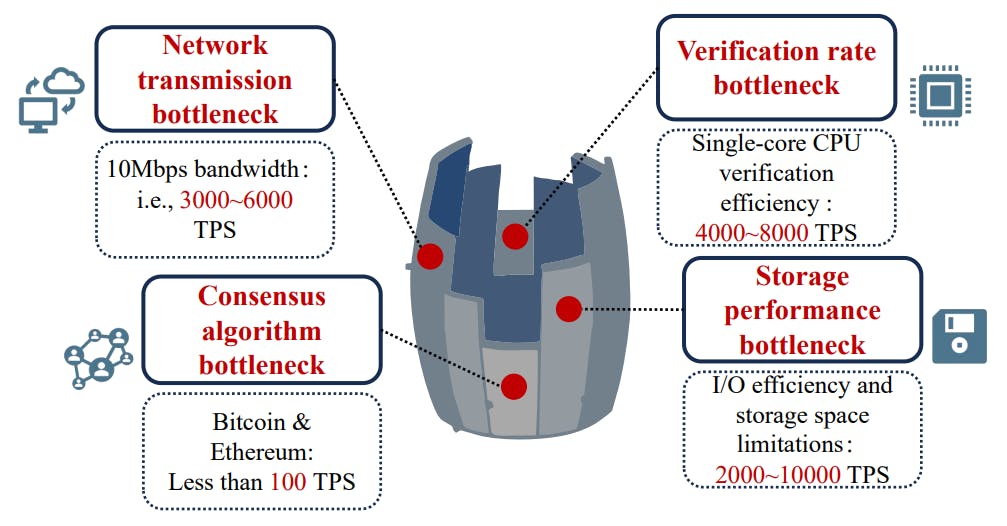Authors:
(1) Lide Xue, University of Science and Technology of China, Hefei, China ([email protected]);
(2) Wei Yang, University of Science and Technology of China, Hefei, China ([email protected]);
(3) Wei Li, University of Science and Technology of China, Hefei, China ([email protected]).
Table of Links
V. Analysis of EZchain's Performance, Security and Decentralization
VI. Simulation Experiments of EZchain
VII. Conclusions, Acknowledgements, and References
Abstract—The development of underlying technologies in blockchain mostly revolves around a difficult problem: how to enhance the performance of the system and reduce various costs of nodes (such as communication, storage and verification) without compromising the system’s security and decentralization. Various layer-1 and layer-2 protocols have provided excellent solutions for this challenge. However, they cannot yet be considered as a “silver bullet”. This paper proposes EZchain—a novel decentralized “scale-out” ledger system designed for web3.0, aiming to enable blockchain technology to truly support ledger applications in large-scale fully decentralized networks. Without compromising security and decentralization, EZchain successfully accomplishes the following milestones: 1) Scalability: The theoretical throughput of EZchain can be infinitely expanded, nearly unaffected by bandwidth and other resource constraints. 2) Consumer-Grade Hardware Compatibility: EZchain is designed to be compatible with consumer-grade hardware, supporting storage, computation, and verification requirements. 3) Efficient Transaction Confirmation: EZchain strives to maintain transaction confirmation delays within one minute. Our prototype experiment demonstrates that under typical daily bandwidth network conditions, EZchain’s performance in all aspects approaches that of the accounts in centralized payment systems. This provides a solid infrastructure for realizing mobile payments in web3.0.
I. INTRODUCTION
In blockchain applications, achieving the same central server-level performance of web2.0 without sacrificing decentralization and security has always been a key bottleneck, also known as the blockchain impossible triangle.
Concerning the above challenges, in this paper we introduce EZchain, a blockchain solution characterized by its highperformance, decentralization, and robust security. Distinct from pseudo-decentralization, layer-2, and off-chain concepts, EZchain adheres strictly to the principles of decentralization, achieving layer-1 performance breakthroughs. EZchain theoretically offers:
-
A constant block size of approximately 0.5 Mb, capable of accommodating an unlimited number of transactions.
-
The performance of “scale-out” exhibits unbounded system throughput.
-
Transaction confirmation within seconds.
-
Feasibility for consumer-level storage, messaging, and verification costs for both consensus and account nodes.
-
Uncompromised security and decentralization.
EZchain implements a pioneering consensus algorithm designed to minimize consensus, transmission, and storage information. It introduces a novel data structure, “value”, distinct from UTXO model in Bitcoin [1] or account balance model. This unique combination of data structure and algorithm, to our knowledge, represents an unprecedented approach in the blockchain scalability field. The underlying rationale for EZchain’s remarkable performance lies in the relative stability of the “value” quantity, as opposed to an ever-increasing transaction volume. This shift in focus to value transfer offers unique advantages and optimization strategies over traditional methods. To empirically assess EZchain’s effectiveness, we developed a prototype simulation system[2], whose experimental results corroborate EZchain’s claims regarding throughput, scalability, transaction confirmation speed, and storage efficiency for nodes.
This paper is
[1] An alternative involves utilizing a “world state” snapshot for verification; however, this still depends on the validity confirmation of the“world state”, either self-validated or by other nodes. In a truly decentralized context,“world state” validation also entails tracing the complete blockchain history.
[2] github.com/Re20Cboy/Ezchain-py


